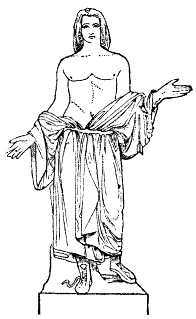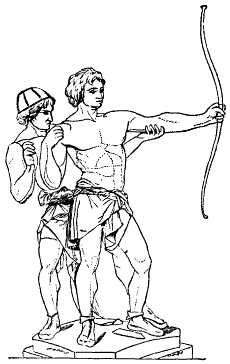Baldr
|
|
In Norse Mythology, Baldr (also Balder, modern Icelandic Baldur), the god of innocence, beauty, joy, purity, and peace, is Odin's second son. His wife is called Nanna and his son was Forseti. Baldr had a ship, the largest ever built, named Hringham, and a hall, called Breidablik. Phol may have been a German name for Baldr, based on the second Merseburg charm, where the same person seems to be referred to as Phol and Balder.
| Contents |
The Prose Edda
Baldr, nicknamed "the beautiful", is known primarily for the myth surrounding his death; that tale is one of the most moving in all Norse literature. His death and the manner of it contribute to another kenning for Baldr, "the slain god". His death is seen as the first in the chain of events which will ultimately lead to the destruction of the gods at Ragnarok. Baldr, however, will, as foretold in the Völuspá, be reborn in the new world.
He had a dream of his own death (or his mother had the same dreams). Since dreams were usually prophetic, this depressed him, and his mother Frigg made every object on earth vow never to hurt Baldr. All but one, an insignificant weed called the mistletoe, made this vow. Frigg had thought it too unimportant and nonthreatening to bother asking it to make the vow (alternatively, it seemed too young to swear). When Loki, the mischief-maker, heard of this, he made a magical spear from this plant. He hurried to the place where the gods were indulging in their new pastime of hurling objects at Baldr, which would bounce off without harming him. Loki gave the spear to Baldr's brother, the blind god Hod, who then inadvertently killed his brother with it. For this act, Odin and Rind had a child named Vali, who was born solely to punish Hod, who was slain.
Baldr was ceremonially burnt upon his ship, Hringham; the largest of all ships. As he was carried to the ship, Odin whispered in his ear. This was to be a key riddle asked by Odin (in disguise) of the giant Vafthruthnir (and which was, of course, unanswerable) in the Vafthruthnismal (the riddle also appears in the riddles of Gestumblindi in Hervarar saga). The dwarf Lit was kicked by Thor into the funeral fire and burnt alive. Nanna, Baldr's wife also threw herself on the funeral fire to await the end of Ragnarok when she would be reunited with her husband (alternatively, she died of grief). Baldr's horse, too, with all its trappings, was burned on the pyre. The ship was set to sea by Hyrrokin, a giantess, who came riding on a wolf and gave the ship such a push that fire flashed from the rollers and all the earth shook.
Upon Frigg's entreaties, delivered through the messenger Hermod, Hel promised to release Baldr from the underworld if all objects alive and dead would weep for him. And all did, except a giantess, Thokk, who refused to mourn the slain god. And thus Baldr had to remain in the underworld, not to emerge until after Ragnarok, when he and his brother Hod would be reconciled and rule the new earth together with Thor's sons.
When the gods discovered that the giantess had been Loki in disguise, they hunted him down and bound him to three rocks. Then they tied a serpent above him, the venom of which dripped onto his face. His wife Sigyn gathered the venom in a bowl, but from time to time she had to turn away to empty it, at which point the poison would drip onto Loki, who writhed in pain, thus causing earthquakes. He would free himself, however, in time to attack the gods at Ragnarok.
The Poetic Edda
In the Elder Edda the tragic tale of Balder is hinted at rather than told at length. Among the visions which the Norse Sibyl sees and describes in the weird prophecy known as the Völuspá is one of the fatal mistletoe. "I behold," says she, "Fate looming for Balder, Woden's son, the bloody victim. There stands the Mistletoe slender and delicate, blooming high above the ground. Out of this shoot, so slender to look on, there shall grow a harmful fateful shaft. Hod shall shoot it, but Frigga in Fen-hall shall weep over the woe of Wal-hall." Yet looking far into the future the Sibyl sees a brighter vision of a new heaven and a new earth, where the fields unsown shall yield their increase and all sorrows shall be healed; then Balder will come back to dwell in Odin's mansions of bliss, in a hall brighter than the sun, shingled with gold, where the righteous shall live in joy for ever more.
Gesta Danorum
Writing about the end of the 12th century, the old Danish historian Saxo Grammaticus tells the story of Balder in a form which professes to be historical. According to him, Balder and Hod were rival suitors for the hand of Nanna, daughter of Gewar, King of Norway. Now Balder was a demigod and common steel could not wound his sacred body. The two rivals encountered each other in a terrific battle, and though Odin and Thor and the rest of the gods fought for Balder, yet was he defeated and fled away, and Hod married the princess. Nevertheless Balder took heart of grace and again met Hod in a stricken field. But he fared even worse than before; for Hod dealt him a deadly wound with a magic sword, which he had received from Miming, the Satyr of the woods; and after lingering three days in pain Balder died of his hurt and was buried with royal honours in a barrow.
The legendary death of Balder resembles the legendary death of the Persian hero Isfendiyar in the epic Shahnama.
Balder's brows
In Scandinavian, the Scentless Mayweed (Matricaria perforata) is named Balder's brows because of its whiteness.
Other names
- Balder (Modern Scandinavian)
- Bealdor (Old English)
- Balder (German)
- Phol (German)
Template:NorseMythologyca:Bàlder cs:Baldr da:Balder de:Balder eo:Baldr es:Baldur fr:Balder is:Baldur/Endurskrifun it:Baldr nl:Baldr ja:バルドル no:Balder pl:Baldur pt:Balder fi:Balder sv:Balder


